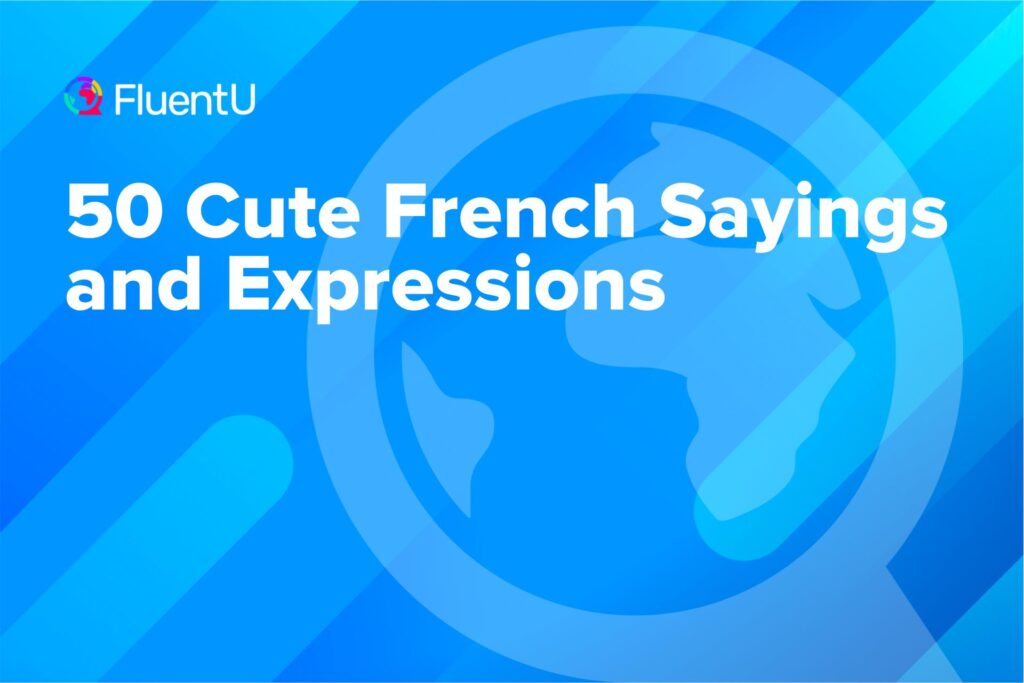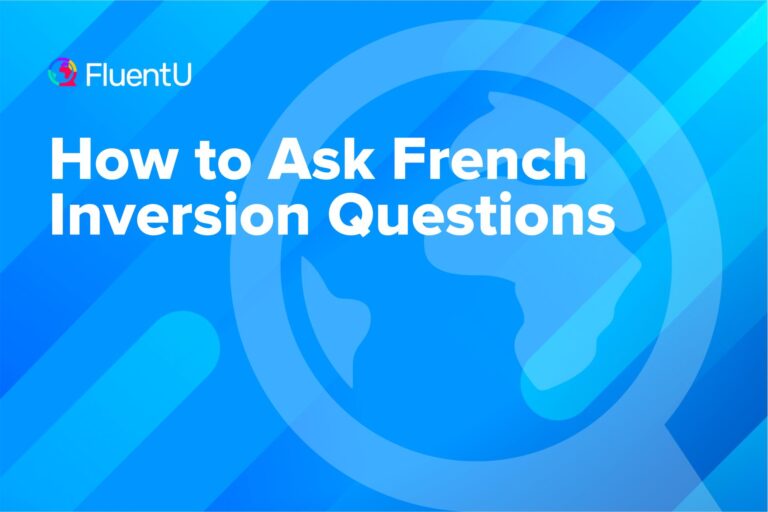50 Cute French Sayings and Expressions

Fall in love with French, and then let French help you fall in love. I mean, what’s the first thing that comes to mind when you think of the French? Their love of food, their beautiful cities and romantic landscapes…or their penchant for romance? Everything the French do, they do it with an artful passion.
In just a few moments, we’ll venture through a lovely list of sayings and expressions brought to you by great French romantics themselves.
Download: This blog post is available as a convenient and portable PDF that you can take anywhere. Click here to get a copy. (Download)
Adorable Terms of Endearment
To start off, these are some of the most popular terms of endearment in French (some might be quite unexpected!):
1. Mon petit chouchou
This is often translated as “my little cabbage” but can also refer to a kind of cream puff pastry. It describes someone who’s very dear to you.
The French like to repeat syllables to make cuter-sounding words, so mon petit chou also becomes mon petit chouchou . These carry slightly different connotations, with chou being sweetheart and chouchou more like darling. It originates from the observation that cabbages and chou pastries are small and round like a baby’s head, which is to be adored.
2. Ma puce
This one translates to “my flea.” This might sound very weird, but it’s thought to originate from when fleas were a daily issue for people and those that they were closest to would pick them off. This isn’t necessarily romantic—it can apply to children as well.
3. Ma bichette
This one is sweet, but watch out: It’s particularly used for younger women! It translates to “my small doe.”
4. Mon mignon / Mon mignonne
This translates to “my little one.” It comes from the old French word mignot which meant dainty. It’s the equivalent of the English “sweetheart.” The feminine version is mignonne.
5. Mon trésor
Translates to “my treasure.”
6. Mon petit loup
A lot of French terms of endearment involve animals, and this one literally means “my little wolf.” This might seem like a funny phrase—wolves are more on the fierce side rather than cute—but it’s because wolves are thought to be loyal and protective.
7. Ma chaton
This one means my “kitten.” A couple of variations are mon petit chat (my little cat) and mon mimi (my pussycat). These are generally used for females!
8. Mon lapin
This translates to “my bunny,” which is another cute animal.
9. Mon amour
Mon amour (or “my love”) is probably the most classic romantic term of endearment in French. You’ll catch it in movies, songs and even novels by the literary greats like Victor Hugo and Marcel Proust. From centuries ago to today’s era of online dating, it’s always been a favorite.
10. Mon chéri / Ma chérie
For a classic expression that you can say more often, there’s mon chéri (for men) or ma chérie (for women). Aside from romantic partners, this also works for family members and close friends.
11. Mon coeur
This somewhat poetic term of endearment means “my heart.” A related term is mon petit coeur (my little heart).
12. Mon doux / Ma douce
People naturally love desserts (and sometimes can’t get enough of them), so it’s understandable why you’d call someone you love the French equivalent of “my sweet.”
13. Mon sucre d’orge
If “my sweet” is too vague, you can get more specific by addressing your significant other as “my candy cane.”
14. Mon bébé
This one translates to “my baby”—a popular term of endearment both in English and French.
15. Mon prince / Ma princesse
These terms of endearment (“my prince” or “my princess”) are especially significant in French culture because it’s where the concept of chivalry came from. Back in the Middle Ages in France, knights actually did exist—and they wrote poetry, performed songs and even went on tournaments for their princesses.
16. Ma moitié
This means “my half,” which pretty much describes the other person as your match.
17. Mon étoile
Calling someone mon étoile (my star) not only expresses affection but also admiration. This person is a shining light in your life—they guide and inspire you while bringing you warmth.
18. Mon petit bijou
Just as a jewel is highly treasured, this term of endearment (“my little jewel”) expresses how rare and special someone is to you.
Romantic French Expressions
After knowing all those terms of endearment, let’s move on to actual French one-liners. Whether you want to make your significant other feel appreciated or flirt with a date, these French expressions will come in handy:
19. Je t’aime.
Je t’aime is the short and simple way to say “I love you” in French. Of course, you won’t go around using this lightly!
You can add another word to je t’aime to change the meaning to “I like you” or “I care about you” (non-romantically): Je t’aime bien . If a friend confesses their love to you with je t’aime, one way to reject them would be to reply with je t’aime bien.
You’ll also probably have heard of je t’adore (I adore you), which is also often used non-romantically with close friends and family.
20. Je te kiffe.
This translates to “I’m really into you” or “I really like you.” It’s very informal, though, and used more by younger people and teenagers, though using this will make you sound more native, as mentioned in the FluentU French YouTube video below:
Kiffer is a French slang word that comes from Arabic, and it means to like or enjoy. You can say Je kiffe chette chanson (I love this song), but then you can also say Je kiffe être avec toi (I really enjoy being with you) or, simply, Je te kiffe.
21. Tu me manques.
This phrase means “I miss you,” but the literal translation is “You are missing from me.” This sounds much more romantic than in English because it implies that the other person is a part of you—and their absence makes you feel incomplete.
22. Est-ce que tu veux sortir avec moi ?
This is the phrase for asking someone out on a date (“Do you want to go out with me?”). It’s meant in a romantic context! When you’re just looking to hang out with a friend, you can say Est-ce que tu veux passer du temps ensemble ? instead.
23. Veux-tu être mon petit ami / ma petite amie ?
If you’re really smitten, then you might want to take the next step already. This is how you’d ask in French, “Would you want to be my boyfriend / girlfriend?”
24. Je suis amoureux / amoureuse de toi.
This means: “I’m in love with you.” Just remember to use amoureux if you’re male and amoureuse if you’re female!
25. Tu me rends heureux / heureuse.
This translates to “You make me happy”—one of the best compliments you can give someone.
26. Je suis fou / folle de toi.
Fou or folle means “crazy,” so this phrase is about being deeply infatuated or head over heels in love with the person: “I’m crazy about you.”
27. Tu es mon âme sœur.
It’s a line that can make anyone swoon: “You are my soulmate.”
28. Je pense à toi tout le temps.
This means, “I think about you all the time.”
29. Tu es mon crush.
“Crush” is a loan word from English, and it’s already pretty common in French. You can guess what this means: “You are my crush.”
30. T’es l’amour de ma vie.
Here’s a more serious expression: “You’re the love of my life.”
31. Je t’aime de tout mon cœur.
This takes je t’aime up a notch: “I love you with all of my heart.”
32. Je veux vieillir à tes côtés.
A lot of songs have been written about this expression, which means, “I want to grow old by your side.”
33. Tu es ma joie de vivre.
Joie de vivre is a popular phrase in French, meaning “joy of living.” You can associate this with the pleasurable things in life, like good food, art, travel, hobbies—and, of course, that special person who makes you very happy.
34. J’adore passer du temps avec toi.
This translates to: “I love spending time with you.”
35. J’ai hâte de te revoir.
You can say this at the end of a date: “I can’t wait to see you again!”
36. Tu es magnifique.
This means: “You are beautiful / gorgeous.” Magnifique is a versatile French word for describing beauty—you can also use it to describe scenery, an impressive performance or even an elegant hotel suite.
37. Je suis reconnaissant / reconnaissante de t’avoir rencontré / rencontrée.
If someone means a lot to you, then you can tell them this: “I am grateful to have met you.”
38. Je trouve que tu es quelqu’un de special.
Here’s another compliment in French: “I think you are someone special.”
39. J’ai envie de te rendre heureux / heureuse.
This translates to “I want to make you happy.”
Wise French Sayings About Love
Aside from everyday French expressions, knowing some timeless sayings will make you sound worldly and wise. Write your favorite ones down in a notebook and try to memorize them. Practice to make your pronunciation perfect. Explore the literature of the writers that really speak to you in these quotes if you’re an advanced learner, and try reading some of their work.
40. “Entre deux cœurs qui s’aiment, nul besoin de paroles.”
Translation: Two hearts in love need no words.
Desbordes-Valmore was a writer in the 19th Century. She wrote mostly poetry, which is considered to be deeply emotional. An anthology of her poetry is available.
41. “Le cœur a ses raisons que la raison ne connaît point.”
Translation: The heart has its reasons of which reason knows nothing.)
Blaise Pascal was the father of Pascal’s triangle. He did a lot of theological/philosophical work, including “Pensées“ (thoughts).
42. “Le seul vrai langage au monde est un baiser.”
Translation: The only true language in the world is a kiss.
Musset was also a writer in the 18th century. He wrote many novels, plays and poems which are worth a read.
43. “Il n’y a qu’un bonheur dans la vie, c’est d’aimer et d’être aimé.”
Translation: There is only one happiness in life, to love and be loved.
George Sand was really a woman, Amantine-Lucile-Aurore Dupin. She had affairs with Chopin and Musset and disobeyed many of society’s rules for women. She also wrote many plays and novels.
44. “L’amour fait les plus grandes douceurs et les plus sensibles infortunes de la vie.”
Translation: Love makes life’s sweetest pleasures and the most sensitive misfortunes.
Scudery was a female writer in the eighteenth century who was a feminist before her time. You can view her complete works here.
45. “Aimer, ce n’est pas se regarder l’un l’autre, c’est regarder ensemble dans la même direction.”
Translation: Love doesn’t mean gazing at each other, but looking, together, in the same direction.
Antoine de Saint-Exupéry, the author of “Le Petit Prince” (The Little Prince), was a writer and aviator of the early 20th century (hence many of his writings involve aircraft.) His work, especially “Le Petit Prince,” is considered classic, and you can explore his other writings here. If you enjoyed C.S Lewis, you will fall in love with St Exupéry’s books.
46. “Je vois la vie en rose”
Translation: I see the world through rose-tinted glasses
Edith Piaf, the great cabaret singer sang mostly of love or sorrow. She had a hard and mostly tragic life despite her fame. Her music can be a great place to start learning about love in French culture.
47. “Un seul être vous manque et tout est dépeuplé.”
Translation: One missing person, and everything is empty.
Alphonse de Lamartine’s poignant words express the profound emptiness and longing that can result from the absence of a loved one. You can check out his books here—Victor Hugo was an admirer of his!
48. “Aimer, c’est tout donner et ne rien attendre en retour.”
Translation: To love is to give everything and expect nothing in return.”
Albert Camus is one of the most prominent (and romantic) French philosophers. One of his ideas was that love, in its purest form, goes beyond personal gain, and we can find meaning in acts of genuine generosity without ulterior motives.
49. “Oh ! Si tu pouvais lire dans mon coeur, tu verrais la place où je t’ai mise !”
Translation: If you could read my heart, you would see the place I have given you there.
This passionate line by Gustave Flaubert captures the depth of emotions in love. Flaubert wrote the classic novel “Madame Bovary,” which is still widely read today.
50. “Je vous souhaite d’être follement aimée.”
Translation: I wish for you to be madly loved.
Andre Breton led the Surrealist movement, which goes against convention and celebrates the subconscious and irrational aspects of human existence. If this quote strikes a chord in you, you might like his book “L’Amour Fou” (Mad Love).
How to Learn More Cute French Sayings
As well as the sayings and cultural insights presented in this article, there are many other opportunities to get your fix:
- Beginners can listen to French love songs. Try Celine Dion’s music—she has a French love album out! Carla Bruni has also written a lot of popular, catchy songs.
- Take a romantic book you’ve already read in English and read it in French. “Twilight” can work for this, since its language is simpler and it has a lot of romantic phrasing.
- Intermediate learners can read French magazines. For example, “Cosmopolitan” often has romance-related articles. A bit limited on cash? You can swap your regular magazine subscription for one in French.
- To get some writing practice in, you could try writing a French love story. You can then ask a French speaker you know to give you some feedback on your writing. If you don’t know anyone, you can post part of the story on r/WriteStreak or LangCorrect.
- For advanced learners, the best way to absorb French romance is to take a trip. Talk to some different people and learn about their relationships, or try your hand at a little flirting. See if you can notice subtle differences—for example, are there differences based on age and status?
- If you can’t take a trip, watch a French rom-com. There are many great ones, including “l’Arnacœur” (Heartbreaker) starring Roman Duris and Vanessa Paradis. It will help you gain a greater sense of culture and nuanced language use.
- Learners at any level can do a little research into the French culture of love, perhaps exploring weddings and marriage in France.
Now that you’ve got all these lovely French words and expressions on your side, it’s time to share your romance with French with the rest of the world! Just don’t go around calling strangers on the street “mon petit chouchou.”
Download: This blog post is available as a convenient and portable PDF that you can take anywhere. Click here to get a copy. (Download)
And One More Thing...
If you like learning French at your own pace and from the comfort of your device, I have to tell you about FluentU.
FluentU makes it easier (and way more fun) to learn French by making real content like movies and series accessible to learners. You can check out FluentU's curated video library, or bring our learning tools directly to Netflix or YouTube with the FluentU Chrome extension.
One of the features I find most helpful is the interactive captions—you can tap on any word to see its meaning, an image, pronunciation, and other examples from different contexts. It’s a great way to pick up French vocab without having to pause and look things up separately.
FluentU also helps reinforce what you’ve learned with personalized quizzes. You can swipe through extra examples and complete engaging exercises that adapt to your progress. You'll get extra practice with the words you find more challenging and even be reminded you when it’s time to review!
You can use FluentU on your computer, tablet, or phone with our app for Apple or Android devices. Click here to take advantage of our current sale! (Expires at the end of this month.)










